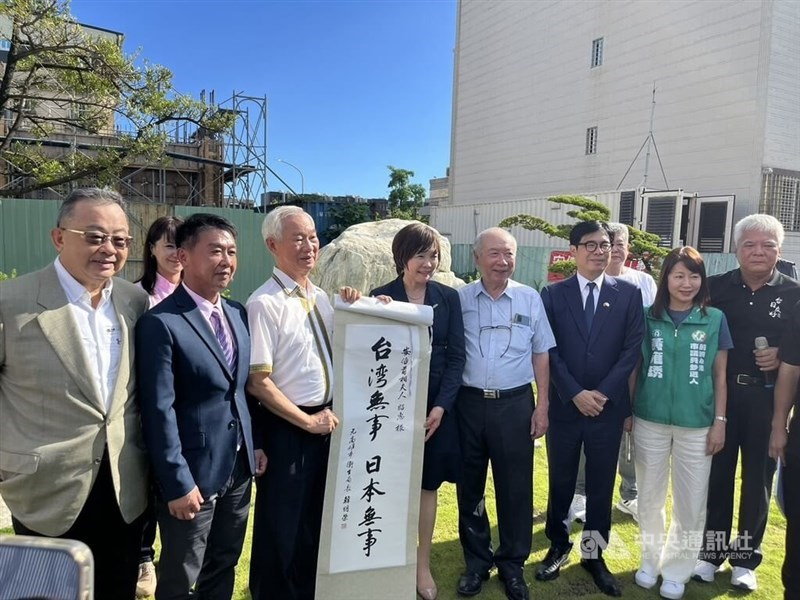In a deeply symbolic visit that transcends politics, Akie Abe, the widow of Japan’s late former Prime Minister Shinzo Abe, arrived in Kaohsiung this week to honor her husband’s legacy. The visit, conducted quietly yet purposefully, underscored the profound respect and strong connections that have long existed between Taiwan and Japan — a bond Shinzo Abe passionately advocated for throughout his life.
A Solemn Pilgrimage to a Spiritual Space
On Friday morning, Akie Abe visited a Buddhist temple in Kaohsiung, where a shrine has been dedicated to the late Japanese leader. The site, adorned with flowers and surrounded by monks, offered a serene space for remembrance and reflection. The shrine has become a place where Taiwanese and Japanese visitors can pay their respects to the former Prime Minister, who was a staunch advocate for closer ties between the two nations.
In an emotional statement at the temple, Akie expressed her gratitude to the people of Taiwan for their unwavering support and remembrance of her husband. According to a witness present at the scene, Akie quietly offered incense and bowed deeply before the altar — a traditional Buddhist ritual symbolizing reverence and respect.
Shinzo Abe’s Enduring Legacy in Taiwan
Shinzo Abe, assassinated in 2022, is remembered in Taiwan not just as a Japanese politician, but as a global statesman who championed democracy and promoted peace and stability across the Indo-Pacific. In his lifetime, Abe advocated for stronger Taiwan–Japan relations, describing the island as a beacon of democracy and a vital partner in preserving a free and open Indo‑Pacific.
Through numerous public statements and legislative efforts, he shaped Tokyo’s policies in a way that deepened connections with Taipei. Under Abe’s leadership, Japan increased cultural exchanges, bolstered economic ties, and advocated for Taiwan’s inclusion in international forums despite resistance from Beijing.
The Importance of This Visit
While this trip is deeply personal for Akie Abe, its resonance goes far beyond a private remembrance. In the context of rising tensions across the Taiwan Strait and increased aggression from the Chinese Communist Party, the visit symbolizes continuity. Akie Abe’s quiet gestures reaffirm the long-standing friendship between the people of Japan and Taiwan, hinting that Shinzo Abe’s vision for closer bilateral ties lives on.
In this era where global politics is increasingly defined by alliances and strategic partnerships, Akie Abe’s visit is a reminder that relationships between nations are built upon shared ideals and mutual respect.
Commentary: The New Dimension of People-to-People Diplomacy
While traditional diplomacy operates within state institutions, gestures like Akie Abe’s visit can be classified as people-to-people diplomacy. These moments foster connections that formal agreements can’t fully capture, reinforcing trust and emotional resonance between nations. In a world where authoritarian narratives often dominate the global discourse, such symbolic gestures highlight the resilience and appeal of democratic alliances.
FAQs
Why did Akie Abe visit Taiwan?
Akie Abe came to honor her late husband Shinzo Abe’s legacy and to thank the people of Taiwan for their ongoing remembrance and support.
What was Shinzo Abe’s significance for Taiwan?
Shinzo Abe was a strong supporter of Taiwan, promoting closer economic, cultural, and political ties between the two nations and referring to Taiwan as a beacon of democracy in the Indo‑Pacific.
What is the symbolism of this visit?
The visit symbolizes the enduring bond between Japan and Taiwan and signifies continuity in the efforts to maintain peace and stability in the Indo‑Pacific.
Will this visit affect Japan–Taiwan relations?
While unofficial, the visit strengthens people‑to‑people connections and highlights Japan’s long‑standing support for Taiwan’s democratic sovereignty.
What role did Shinzo Abe play in strengthening Japan–Taiwan relations?
Shinzo Abe was pivotal in promoting security and economic cooperation between Japan and Taiwan, supporting Taiwan’s inclusion in international organizations, and emphasizing its role in the global democratic order.


